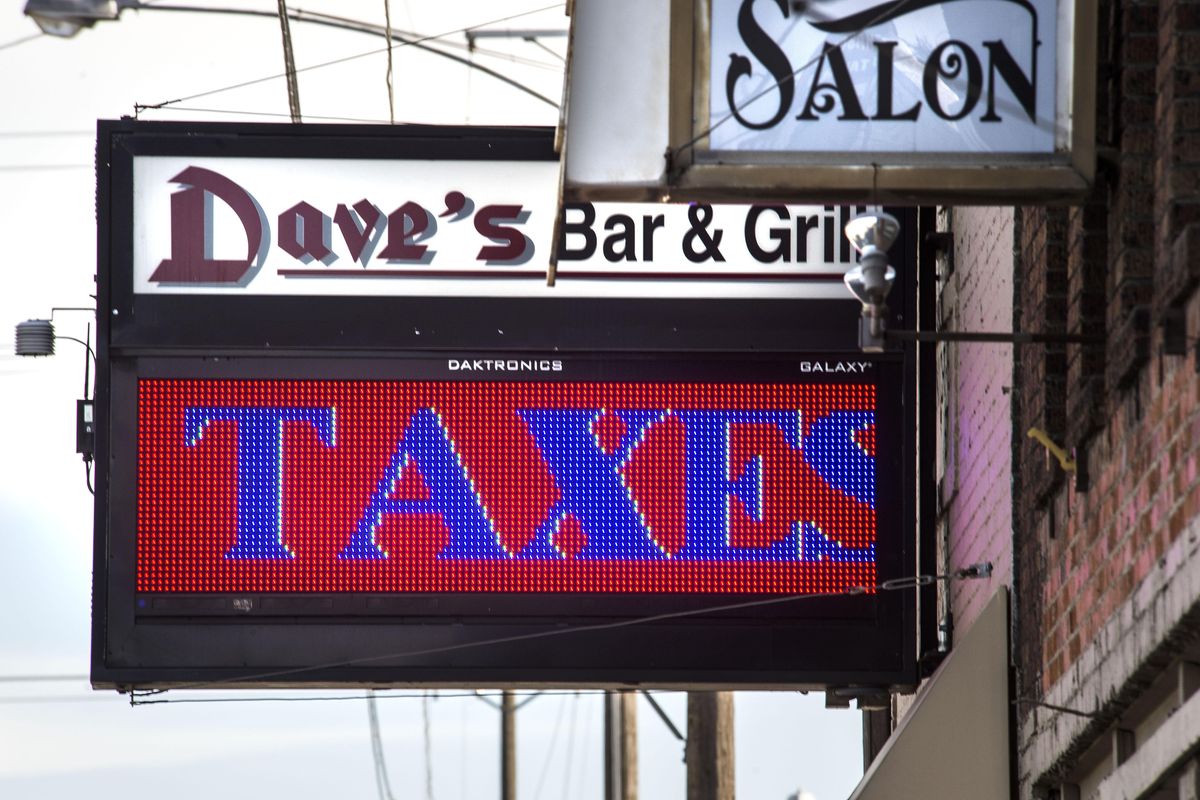Tax-averse Spokane Valley City Council proposes new utility tax

The sign at Dave’s Bar and Grill in Spokane Valley is clear: “Dear city, you promised no utility taxes. Please keep your promise.”
Owner Dave Thompson said he put the sign up in response to the city of Spokane Valley’s proposed 6 percent utility tax, which he said will have a big impact on small businesses.
“I also worry about people on a fixed income,” Thompson said.
The 6 percent utility tax on water, power, garbage, sewer and natural gas was proposed Tuesday at the Spokane Valley City Council meeting. It’s headed for a hearing and a first reading at the council meeting on the evening of Nov. 8 – Election Day.
The new utility tax would replace dwindling tax revenue coming in from a 6 percent utility tax on phone lines that’s been used to finance street maintenance. The phone tax will go away.
Thompson said Spokane Valley’s founders promised no utility taxes and that’s what prompted him to put his reader board up.
“That little phone tax is nothing compared to adding 6 percent on everything else,” Thompson said.
The potential utility tax isn’t a surprise; Mayor Rod Higgins has mentioned it several times and the City Council has discussed it throughout the 2017 budget development process.
The city needs about $6.1 million to preserve and maintain its roads, but annual revenue from the phone tax has fallen from $3.05 million in 2009 to $2.3 million and is still declining because households are reducing their number of phone lines.
Former City Councilman Bill Gothmann was on the road committee when Spokane Valley incorporated.
He said everyone felt strongly that keeping roads in great shape should be one of the fledgling city’s top priorities.
“We caught holy hell for passing that 6 percent phone tax without putting it out to a vote of the people” in 2009, Gothmann said.
Spokane Valley is serviced by several utilities, including Vera Water and Power District. Jim Fields, Vera’s assistant general manager, said a 6 percent tax amounts to about $960,000 a year for Vera Water, an expense that would have to be passed on to the utility’s customers.
And there’s another hitch: Fields said Vera Water and Power, like most every other water or irrigation district in Spokane Valley, is a local government or a quasi-municipality, which may mean it can’t be taxed by Spokane Valley.
“It’s a huge legal mess,” Fields said. “We already have our attorney on this. Whether we can be taxed will have to boil down to what’s legal.”
Spokane Valley Finance Director Chelsie Taylor said she believes recent court rulings have cleared up the issue about whether a municipality, like the city, may tax another municipality like a water district.
“Based on what I know and on conversations with our legal department, I don’t think it will be a problem,” Taylor said.
Fields said he’s concerned the City Council seems to be moving quickly on the proposed new tax’s first hearing and reading, and questions the motivation behind putting such a big issue on the agenda on Election Night.
“I wish they’d sought some input from us,” Fields said.
City Councilman Ed Pace, who ran partly on a promise of no new taxes, said he still hates to raise taxes, but in this case believes there’s no other option.
As for the timing, he said, “We have a meeting on Election Night because we have so much we need to get done, that’s why.”
Pace said it wouldn’t be possible to raise property taxes enough to secure the needed road funding, and that the longer the city waits to replace or resurface a road, the more expensive it gets.
“Staff says a dollar spent maintaining a road now saves us $9 later,” Pace said.
Most other municipalities locally tax more utilities than just phone lines, according to a table put together by Spokane Valley staff. For example, the tax on private utilities in the city of Spokane (electricity, gas, telecommunications and cable TV) is 6 percent, while the tax on garbage service, water and sewer is 20 percent.
Gothmann gives Spokane Valley’s current council credit for dealing with an issue that should have been addressed sooner.
“The lack of funding is now not only affecting the construction of roads, but also actual maintenance of roads,” Gothmann said. “It has to be done.”